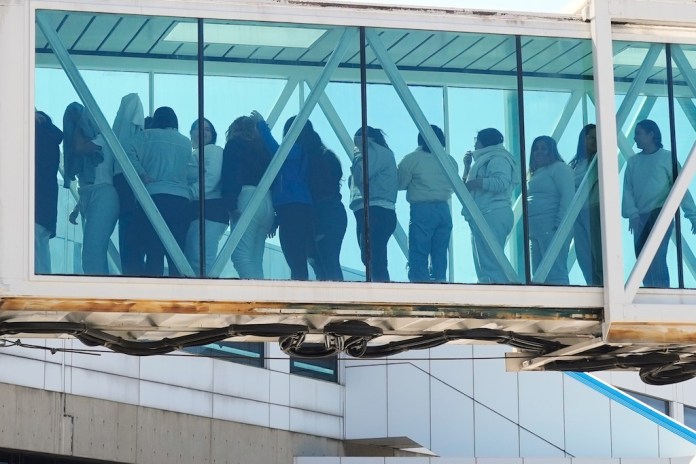DOJ accuses Illinois officials of inciting immigration protests in Chicago
The Trump administration has accused Illinois officials of encouraging protests against ICE (Immigration and Customs Enforcement) agents and requested in Supreme Court filings to deploy the National Guard in Chicago. The administration argues that local police are unable to adequately protect federal immigration officers from violent demonstrations. Both sides have submitted briefs to the Supreme Court over a Justice Department petition aimed at lifting lower court injunctions that blocked national Guard deployment in the city. The legal dispute focuses on the interpretation of a federal law that allows the president to federalize national Guard troops when “regular forces” cannot enforce laws. The Trump administration contends that “regular forces” do not include the military, arguing that the law supports the use of the National guard in such situations. Illinois officials counter that the president’s order is subject to judicial review and that the administration’s broad interpretation favors unchecked presidential power. Meanwhile, while National Guard deployment authorized by Trump has proceeded in Los Angeles, courts have halted similar deployments in Portland and Chicago. Additionally, a judge ruled that the deployment of National Guard troops in Memphis, Tennessee, exceeded state authority and was unlawful, though that ruling is temporarily stayed pending appeal.
Trump administration accuses Illinois officials of inciting ICE protests
The Trump administration accused Illinois officials of inciting protests, asking in filings to the Supreme Court on Monday to allow the use of the National Guard in Chicago with the argument that local police are not capable of helping protect federal immigration officers from unruly demonstrations.
Both the Trump administration and Illinois officials submitted reply briefs to the Supreme Court as part of the Justice Department’s petition to the justices, seeking to lift a stay from a pair of lower federal courts blocking the deployment of National Guard personnel to the city to protect federal assets and officials.
“In sum, the President was not required to leave DHS agents to fend for themselves in Illinois while state and local officials incite their attackers and the police drag their feet in responding to life-threatening emergencies,” the DOJ brief to the Supreme Court said.
“Although the President could send in active-duty soldiers, he acted well within his discretion in determining that National Guardsmen were the more appropriate forces to deploy—and regardless, Section 12406(3) does not require him to make that determination and would not subject him to judicial review even if it did,” the brief continued, referring to the law President Donald Trump invoked to deploy troops to Chicago.
The new set of briefs centers on whether “regular forces,” in the language of 10 U.S. Code §12406, includes the military. The law Trump cited allows the president to federalize and deploy National Guard troops when the “President is unable with the regular forces to execute the laws of the United States,” among other provisions. He has invoked that law in bids to deploy National Guard members to Los Angeles, Portland, and Chicago.
The administration argues that “regular forces” do not include the military, calling Illinois’s assertion that it does counter to other laws and the history of the statute in question.
“Reading it that way would divorce it from the Constitution’s Militia Clause and the 1792 and 1795 Militia Acts, all of which authorized the militia to be called up to execute the laws in cases of domestic disturbances without regard to whether the standing military could do so too,” the DOJ’s reply brief said.
“Nor do respondents provide any explanation for why Congress would require the standing military to be the first line of defense for civil law enforcement, but not for invasions and rebellions—despite the standing military being far better suited for the latter than the former,” the brief added.
Illinois officials argued in their brief that the Trump administration’s stance is “inconsistent with the term’s common usage,” and that the president’s order is reviewable by courts despite the DOJ’s assertion that it is not.
“They eschew traditional tools of statutory interpretation in favor of a policy preference for the President’s unfettered ability to deploy the National Guard in American communities,” the Illinois brief said about the DOJ’s stance on the president’s ability to deploy troops.
DOJ TELLS SUPREME COURT TO GIVE TRUMP ‘EXTRAORDINARY DEFERENCE’ TO DEPLOY TROOPS TO CHICAGO
The president’s use of the National Guard in multiple cities to protect federal assets and officers has been met with a mixed response by federal courts. While Trump’s deployment to Los Angeles has been allowed to continue without issue since June, his deployments to Portland and Chicago are currently halted by different federal courts.
While not issued by Trump, another National Guard deployment was ruled unlawful Monday evening. In Tennessee, a judge ruled that Gov. Bill Lee’s (R-TN) deployment of troops to Memphis, which was done in conjunction with Trump’s crime crackdown efforts in the city, exceeded his power under the state constitution. The ruling has been stayed for five days to allow for an appeal by state officials.
" Conservative News Daily does not always share or support the views and opinions expressed here; they are just those of the writer."


